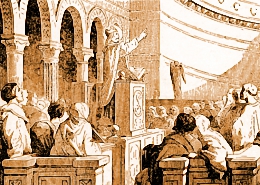Lives of the Saints
Our Models and Protectors
Spiritual Bouquet:
February 19

Saint Barbatus
Bishop of Benevento
(† 682)
Saint Barbatus was born in the territory of Benevento in Italy, toward the end of the pontificate of Saint Gregory the Great, in the beginning of the seventh century. His parents gave him a Christian education, and Barbatus in his youth laid the foundation of the eminent sanctity which recommends him to our veneration. The innocence, simplicity, and purity of his manners, and his extraordinary progress in all virtues, qualified him for the service of the altar, to which he was admitted by receiving Holy Orders as soon as the canons of the Church would allow it. He was immediately employed by his bishop in preaching, for which he had an extraordinary talent, and, after some time, made parish priest of Saint Basil's Church in Morcona, a town near Benevento.
His parishioners were steeled in their irregularities, and they treated him as a disturber of their peace, persecuting him with the utmost violence. Finding their malice conquered by his patience and humility, and his character shining still more brightly, they had recourse to slander. Here their virulence and success was such that their bishop was obliged to withdraw his charitable endeavors among them. Barbatus returned to Benevento, where he was received with joy.
When Saint Barbatus entered upon his ministry in that city, the Christians themselves still retained many idolatrous superstitions, which their duke, Prince Romuald, authorized by his example. They expressed a religious veneration for a golden viper and prostrated themselves before it; they also paid superstitious honors to a tree, in ceremonies ending in public games. Saint Barbatus preached zealously against these abuses. Finally he roused the attention of the people by foretelling the distress and the calamities which their city was to suffer from the army of the Emperor Constans, who, landing soon afterwards in Italy, laid siege to Benevento. The bishop of Benevento died during the siege, and after public tranquility was restored, it was Saint Barbatus who was consecrated bishop to replace him, in March of 663.
Invested with the episcopal character, Saint Barbatus pursued and completed the good work he had so fittingly begun, and destroyed every trace of superstition in the entire state. After nineteen years of these labors he died on February 29, 682, being about seventy years old.
Reflection. Saint Augustine says, When the enemy has been cast out of your hearts, renounce him not only in word but in works; not only by the sound of the lips, but in every act of your life.
Little Pictorial Lives of the Saints, a compilation based on Butler's Lives of the Saints and other sources by John Gilmary Shea (Benziger Brothers: New York, 1894).